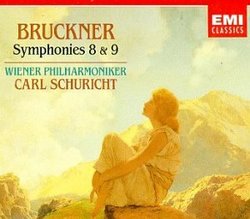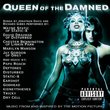| All Artists: Anton Bruckner, Carl Schuricht, Wiener Philharmoniker Title: Bruckner: Symphonies 8 & 9 Members Wishing: 0 Total Copies: 0 Label: EMI Classics Release Date: 1/23/1992 Genre: Classical Style: Symphonies Number of Discs: 2 SwapaCD Credits: 2 UPC: 077776727929 |
Search - Anton Bruckner, Carl Schuricht, Wiener Philharmoniker :: Bruckner: Symphonies 8 & 9
 | Anton Bruckner, Carl Schuricht, Wiener Philharmoniker Bruckner: Symphonies 8 & 9 Genre: Classical Recorded in the early sixties, these performances reveal the underrated Carl Schuricht's loving, cogent way with Bruckner. In turn, the Vienna Philharmonic coddles Bruckner's tender moments without smothering them in tonal... more » |
Larger Image |
CD DetailsSynopsis
Amazon.com Recorded in the early sixties, these performances reveal the underrated Carl Schuricht's loving, cogent way with Bruckner. In turn, the Vienna Philharmonic coddles Bruckner's tender moments without smothering them in tonal goo, and their beautiful playing is captured in sumptuous, yet clearly detailed sound. A true bargain for Brucknerians everywhere. --Jed Distler Similarly Requested CDs
|
CD ReviewsSchuricht is an Outstanding Brucknerian Johannes Climacus | Beverly, Massachusetts | 10/13/2009 (5 out of 5 stars) "If you haven't yet discovered the artistry of Carl Schuricht, here is a golden opportunity. Schuricht was a gentle giant among conductors of his generation: self-effacing, unglamorous, totally dedicated to both the letter and the spirit of the score. In the case of Bruckner, these attributes are particularly important, for his introverted muse retreats at any hint of glamorization or excess opulence. There are several Schuricht accounts of both symphonies available, but these are his only studio recordings. Listeners who don't mind the exigencies of live performances are encouraged to check out broadcast versions of the Eighth and Ninth by Schuricht and the SWR Stuttgart symphony orchestra, available on Hänssler Classics. Though in terms of orchestral execution, they are far from perfect performances, the interpretations are generally more spontaneous and intense than was the case in these early stereo recordings from EMI. Like Furtwängler, Schuricht was somewhat shy of the recording studio, and his commercial recordings can sound inhibited when compared to the many live accounts of the same repertoire. That having been said, no-one in likely to complain that these famous recordings from EMI, featuring the VPO at its considerable best, and spacious, well-focused early Stereo sonics, are anything less than deeply satisfying. Indeed, they are little short of glorious. The Eighth, in particular, successfully combines elemental vigor with high contemplation, in a reading that always maintains forward impulse yet never seems rushed. Due to Schuricht favoring the somewhat truncated 1890 edition of the score, along with his proclivity for brisk tempos, the entire performance takes only 71'--one of the quickest, in terms of overall timing, on record. Yet Schuricht manages to achieve a sense of spaciousness, indeed graciousness, that many more deliberate accounts miss. The naturalness and purity of Schuricht's approach also works well in the the Ninth, though I can think of several other versions (Furtwängler, Horenstein, Solti, Karajan) that bring out the grimness and turbulence of Bruckner's harrowing vision more effectively. Some listeners might find Schurcht a wee bit tame in comparison with these other classic accounts of the score (yes, I consider Solti's a classic account of the score; try it, you'll like it!). Yet there is a place on my shelf, and in my heart, for Schuricht's warmly lyrical, less demonstrative interpretation--more "settled" than unsettling though it is. As indicated, in both of these works, all departments of the VPO play superbly. The sound, though early Stereo, is remarkably good--as warm and ingratiating as the performances themselves. Too bad this set, once economically priced, is now available only as an expensive import. Given price differentials, I suppose it would be imprudent of me to recommend this over bargain-priced versions of these works. Yet I strongly urge listeners who haven't yet explored Schuricht's distinctive way with this composer to consider purchase; you won't be disappointed--for these are by any standard truly exceptional recordings of these highest peaks in the Brucknerian range." A superb Brucknerian conductor! Hiram Gomez Pardo | Valencia, Venezuela | 03/14/2006 (5 out of 5 stars) "It 's a shame that this hyper talented director does not figure with major intensity in the musical memory of the most of Brucknerian listeners.
If you take a look around about the fortunate association with the Vienna Philharmonic, you may check that out of a total of 19 concerts conducted five works by Bruckner: Te Deum, The Fifth, Seventh, Eighth and Ninth. His fevered intensity and overflowing vitality, was supported by that profound and total domain of the demanding score. Schuricht conducted Bruckner as Boult did it with Elgar , (if the comparison is allowed). He bestowed those works of such stature and architectonic dimensions, nourished with that cosmic gaze and enraptured phrasing, where the meditative aspect was narrowly related with that fervent passion, who reminds us to Wilhelm Fürtwangler. It is time for the new musical generations to make this journey into Schuricht ` s universe, because the final result will justify by far those aspects the word hardly can explain. " |







